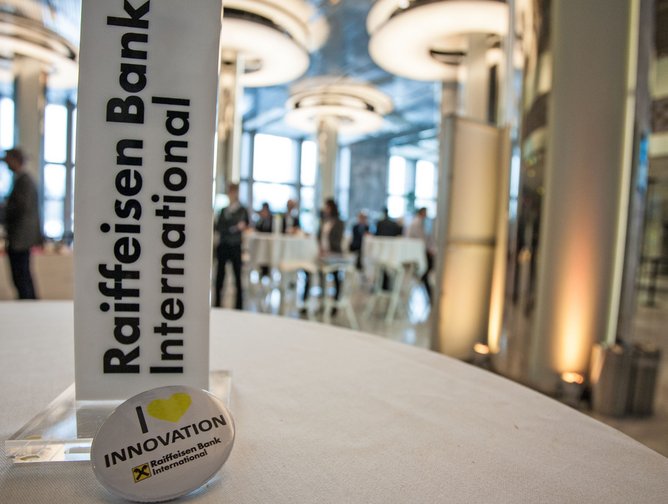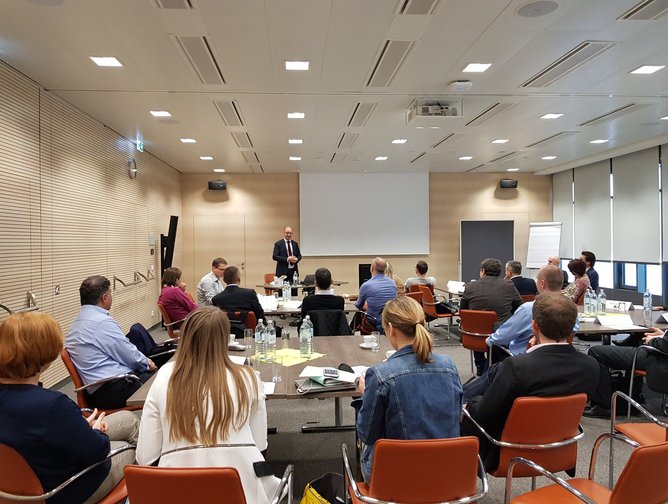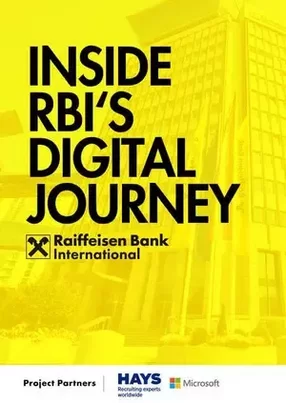How Raiffeisen Bank International is embracing the digital revolution of the financial world
Technology continues to define, and redefine, the global financial industry. Over the last decade, more and more financial organisations, banks and insurers have had to undergo significant transformations, embracing the ever-changing effect of technological innovation.
As companies turn towards technology to define their strategy and future, the role of the CIO has never been more important than it is today.
“Technology has become the very engine that drives the financial industry,” says Robert Fritz, Group CIO and Managing Director, Raiffeisen Bank International AG (RBI). “As a CIO, you have to be an enabler, so that the company can take advantage of the opportunities and potential that IT can bring. Not only that, but there is much more responsibility in enabling the company to keep up with and respond to the ever-changing customer expectation.”
Servicing about 16.5mn customers across Central and Eastern Europe (CEE), and being the second largest bank in Austria, RBI has a fairly large footprint, and it is this footprint that Fritz is tasked with significantly enriching through technology.
The journey, Fritz describes, will see RBI move from its traditional centralised approach to a much more synergetic one.
“This journey is centred around adopting synergetic approaches to the business itself,” says Fritz. “That means looking at our front-end channels and our mobile channels and investigating what the real difference is in customer expectation when it comes to the mobile experience.”
The financial industry is but one of many, if not all global industries that is embracing technology more and more. As RBI develops its end channels and the way it works with customers, Fritz must look at exactly what the customer expects and how they want to engage with the company.
RBI is currently exploring a number of technology solutions designed to embrace the digital experience and leverage synergies with the physical world.
“Not only are we looking at implementing mobile channels through which our customers can interact and engage with us, we are already enabling digital account opening services,” says Fritz. “This incorporates a number of ways in which customers can verify their identities through these digital channels for e.g. video identification.
“There are many products we are exploring so that we can deliver our services without touching the branch. It’s about taking the customer experience to a new level and offering a digital experience.”
The challenge, then, in seeking ways to implement and offer a digital experience for the customer is ensuring that the solutions and the technologies that RBI implements remain relevant and in line with customer expectation.
With technology there is always a risk – the cost of failure in an industry that is continuously evolving is extremely high. This can breed a culture of implementing technology for the sake of implementing technology, as opposed to implementing what works. Fritz recognises this, noting that there are certain “buzzwords” that currently populate the technology conversation throughout the financial industry.
Fritz’s approach is to identify opportunities in which technology can actually enrich customer experience.
“There is a spectrum of buzzwords out there such as blockchain, artificial intelligence and machine learning, to name just a few,” he says. “Basically, it’s about identifying and applying technologies that fit into the structure of your footprint.”
As a key player in the CEE financial markets, RBI has always positioned itself closely to its customers. The customer and customer expectation have been the key drivers of change across the industry most of the times, but for Fritz it is important to remember that the regulators have become and will continue to be an equally significant factor.
“Our transformational journey actually started some years ago when the regulators began implementing strict requirements on the financial industry, particularly from the perspective of transparency and data requirements,” he says. “We’ve invested a lot into developing the capabilities that a modern financial institution needs and harmonising data across the RBI Group. That transformation is ongoing and will most likely continue in the future.”
Data, of course, is one of the biggest buzzwords in the financial industry, but with the regulatory pressures that come with it, it becomes much more than just that. It becomes an opportunity to learn more about the customer. But as the industry continues to move away from physical branches, Fritz believes it should hold on just a little.
“It’s not an ideal future where we lose physical contact with our customers,” he says. “We need to be in touch with them to understand what their thoughts and needs are, but also to understand what is happening in the industry from their perspective.”
Fritz notes that this approach allows RBI to gain a much more comprehensive picture of what the financial customer wants from an organisation and he admits that in some cases it actually opens the company’s eyes to solutions or opportunities that it hadn’t considered.
The challenge then becomes one of turning data into value, both for RBI and the customer.
Fritz approaches this by creating a dialogue between various areas of the organisation. This sees business leaders, IT teams, marketing and operations sitting together and breaking down the information they receive from customers and understanding exactly how to implement it into future decision making.
Technology has always been and will continue to be an ever-evolving beast, and so is this journey of discovery that RBI is currently undergoing.
“The question really is, will this journey ever end?” says Fritz. “Look over the last 30 or 40 years and the first digitisation of payments. To me, that was the beginning of IT continuously disrupting and evolving the financial industry. For both an organisation and a manager, the trick is to be as agile as you can to follow these developments.”
As the financial industry continues to be redefined by technology, Fritz believes that as its influence continues to grow, some could argue that it could become a technology industry itself. This in turn would lead to the development of new industrial ecosystems, and for Fritz it is crucial that companies find their roles in them.
“Defining your role will help you become a much more relevant player in the market,” he says. “I am sure that, by actively embracing the future, the RBI Group can root itself into a key role within these ecosystems across our footprint so that we can truly safeguard its leading position in our region.”




